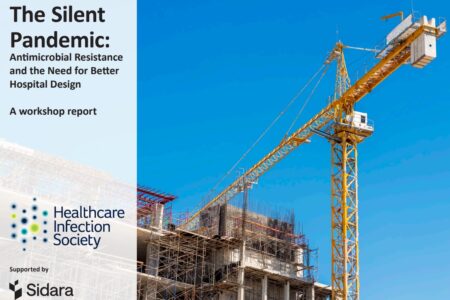Report calls for ‘urgent rethink’ on hospital design to reduce infections

A new report is calling for an ‘urgent rethink’ of the way hospitals are designed, built, and maintained in an effort to reduce healthcare-associated infections (HCAIs).
The nine-page document, entitled The Silent Pandemic: Antimicrobial Resistance and the Need for Better Hospital Design, has been published by the Healthcare Infection Society (HIS) and highlights the need for a fresh approach to the delivery of healthcare infrastructure in light of the estimated 200 deaths which occur around the world every hour as a result of HCAIs.
Supported by built environment consultancy, Sidara, the report follows a high-level workshop held in March and brings together insights from infection prevention and control (IPC) experts, architects, engineers, and healthcare construction professionals.
We need to move from conversation to co-ordinated action – making infection prevention a fundamental requirement of every healthcare build and renovation project
And it explores the systemic failures that allow infection risks to persist in healthcare settings and outlines practical, collaborative solutions to embed IPC at the heart of hospital infrastructure.
The problem, it states, is that IPC professionals are often brought into hospital design projects too late – typically after contracts are signed, designs are finalised, and construction is already underway.
This results in missed opportunities to integrate infection prevention and control into fundamental design decisions.
It also identified poor communication between stakeholders and a lack of regrouping when cost-saving measures are implemented, designs are changed, and installation has to be adapted, leading to compromised infection prevention and control measures.
And it criticised the lack of a formal review process to capture and share lessons learned from past projects.
As well as highlighting the shortfalls in current approaches, the report also makes a number of recommendations for improvement, including:
- Involving IPC professionals from the earliest stages of design and planning
- Introducing mandatory IPC training across disciplines
- Standardising best-practice design frameworks for infection prevention
- Leveraging innovation, including AI and IoT, to improve monitoring and reduce human error
- Balancing clinical needs with sustainability goals without compromising safety
As a direct outcome of this work, HIS has announced the formation of the Built Environment Infection Prevention Initiative (BEIPI) – a cross-sector taskforce dedicated to embedding infection prevention principles into the design, construction, and operation of healthcare settings.
“The creation of BEIPI is a vital next step,” said HIS chair, Dr Manjula Meda.
“We need to move from conversation to co-ordinated action – making infection prevention a fundamental requirement of every healthcare build and renovation project.”
A more-comprehensive white paper will follow in the autumn.
